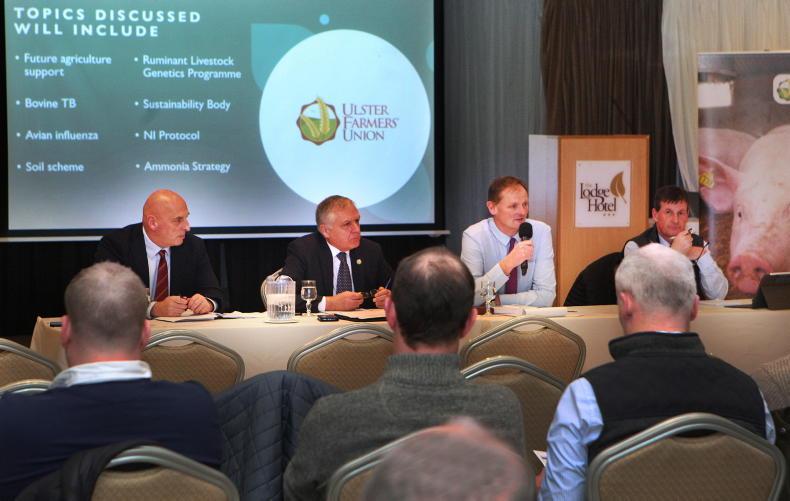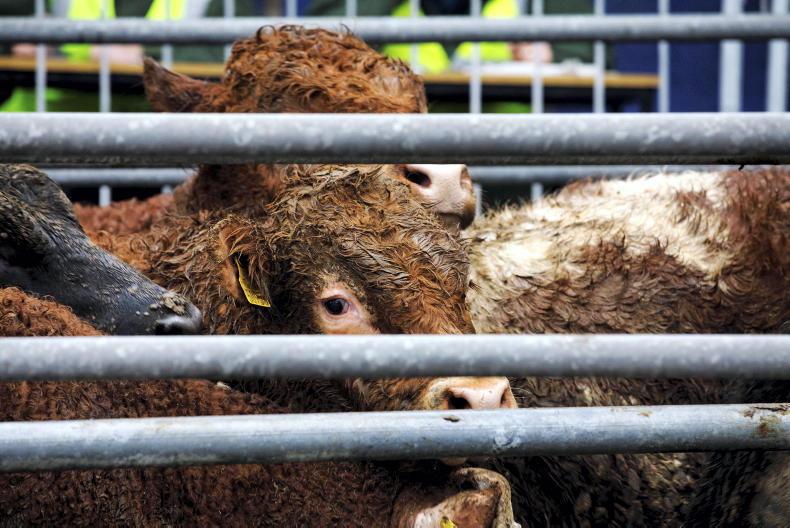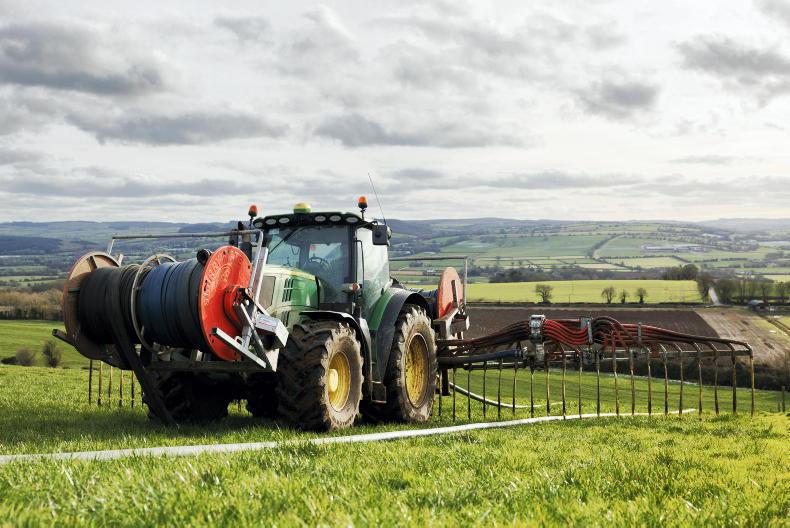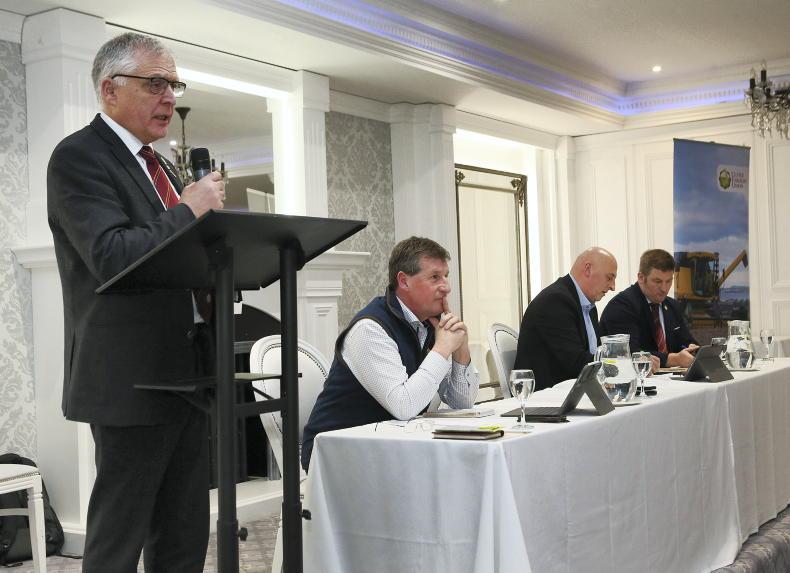Detailed proposals for a new support payment for NI sheep farmers are being finalised by a group of industry bodies and will be sent to DAERA shortly for consideration.
The current plan for future agricultural policy in NI includes headage payments for suckler cows and beef cattle, but there are no specific schemes for the sheep sector.
“DAERA indicated it was something they would be prepared to re-visit if we could put together the right case for specific sheep sector support,” said Ulster Farmers’ Union (UFU) deputy president John McLenaghan.
A taskforce was set up with representatives from the UFU, the NI Agricultural Producers’ Association, the National Sheep Association and the
Livestock and Meat Commission.
The former chief economist of Quality Meat Scotland, Stuart Ashworth, is working with the group to produce proposals for how a new sheep scheme could work in practice.
“It is about showing efficiencies through improving the likes of genetics, lambing ratios, flock health and records. We are also looking at environmental benefits of grazing sheep in certain habitats,” McLenaghan said.
“We can’t make any promises about what the outcome will be, but we are optimistic that something will come of it,” he added.
The initial plans appear similar to the Sheep Improvement Scheme in the Republic of Ireland, where farmers pick measures from a menu of options and a payment of €12/ewe is available.
At a meeting in Coleraine on Monday, McLenaghan was clear that a NI sheep scheme would not be funded from the ring-fenced £50m coupled support budget which is planned for future suckler and beef headage payments.
“Part of our submission is that grazing sheep has an environmental benefit, especially on hills. For that reason alone, we think that money should come out of a green pot,” McLenaghan said.
“By doing that, we will be bringing in additional money rather than taking money away from the suckler beef sector to give it to the sheep sector,” he added.
Progress with NI livestock
genetics programme
There has been significant progress with the development of a long-awaited ruminant livestock genetics programme for NI, UFU chief executive Wesley Aston has confirmed.
Speaking in Coleraine on Monday, Aston said a new industry-led body will oversee the programme and it is to be chaired by former UFU president Victor Chestnutt.
The official register of UK companies shows that both Chestnutt and Aston have been appointed directors
of a new entity called Sustainable Ruminant Genetics Limited.
“Initially it will be for dairy and beef sectors, but we want sheep involved too. There won’t be money needed from farmers. We originally thought there may be some sort of levy but that isn’t the case,” Aston said.
He explained a range of industry bodies initially put forward £100,000 to employ consultants to get the project off the ground and funding from government worth £11.5m over five years has now been earmarked.
“We have a business case that is currently going through the Department of Finance. We hope that will be rubber-stamped very quickly.
“After that, we will be looking at a service provider. We have been having discussions with ICBF in the south, with AHDB, with SRUC, and lots of other genetics bodies,” Aston said.
A programme for improving livestock genetics in NI was initially recommended back in 2013 in the Agri Food Strategy Board’s Going for Growth report.
DAERA’s future farm support policy states that farmers will need to supply data to the genetics programme to claim new suckler and beef headage payments.
UFU chief sees ‘game changer’ for NI farms
A new system of farm support payments and various projects that are coming to fruition at present will have a positive effect on NI farms, the chief executive of the UFU has said.
“I have been involved in the UFU for 30 years but where we are now is a real game changer for the industry,” Wesley
Aston told UFU members in Coleraine.
He explained that former Agriculture Minister Edwin Poots signed off on plans for various projects before he left office last year.
This includes a new agricultural policy, a NI-wide soil testing and carbon auditing scheme, a livestock genetics programme, and a sustainability body.
“Despite the fact we don’t have an operating Executive at Stormont, we can still progress with these issues,” Aston said.
“It’s all very positive stuff. Our counterparts in Britain would take the arm off you to get the opportunities that we [in NI] have in front of us,” he added.
Detailed proposals for a new support payment for NI sheep farmers are being finalised by a group of industry bodies and will be sent to DAERA shortly for consideration.
The current plan for future agricultural policy in NI includes headage payments for suckler cows and beef cattle, but there are no specific schemes for the sheep sector.
“DAERA indicated it was something they would be prepared to re-visit if we could put together the right case for specific sheep sector support,” said Ulster Farmers’ Union (UFU) deputy president John McLenaghan.
A taskforce was set up with representatives from the UFU, the NI Agricultural Producers’ Association, the National Sheep Association and the
Livestock and Meat Commission.
The former chief economist of Quality Meat Scotland, Stuart Ashworth, is working with the group to produce proposals for how a new sheep scheme could work in practice.
“It is about showing efficiencies through improving the likes of genetics, lambing ratios, flock health and records. We are also looking at environmental benefits of grazing sheep in certain habitats,” McLenaghan said.
“We can’t make any promises about what the outcome will be, but we are optimistic that something will come of it,” he added.
The initial plans appear similar to the Sheep Improvement Scheme in the Republic of Ireland, where farmers pick measures from a menu of options and a payment of €12/ewe is available.
At a meeting in Coleraine on Monday, McLenaghan was clear that a NI sheep scheme would not be funded from the ring-fenced £50m coupled support budget which is planned for future suckler and beef headage payments.
“Part of our submission is that grazing sheep has an environmental benefit, especially on hills. For that reason alone, we think that money should come out of a green pot,” McLenaghan said.
“By doing that, we will be bringing in additional money rather than taking money away from the suckler beef sector to give it to the sheep sector,” he added.
Progress with NI livestock
genetics programme
There has been significant progress with the development of a long-awaited ruminant livestock genetics programme for NI, UFU chief executive Wesley Aston has confirmed.
Speaking in Coleraine on Monday, Aston said a new industry-led body will oversee the programme and it is to be chaired by former UFU president Victor Chestnutt.
The official register of UK companies shows that both Chestnutt and Aston have been appointed directors
of a new entity called Sustainable Ruminant Genetics Limited.
“Initially it will be for dairy and beef sectors, but we want sheep involved too. There won’t be money needed from farmers. We originally thought there may be some sort of levy but that isn’t the case,” Aston said.
He explained a range of industry bodies initially put forward £100,000 to employ consultants to get the project off the ground and funding from government worth £11.5m over five years has now been earmarked.
“We have a business case that is currently going through the Department of Finance. We hope that will be rubber-stamped very quickly.
“After that, we will be looking at a service provider. We have been having discussions with ICBF in the south, with AHDB, with SRUC, and lots of other genetics bodies,” Aston said.
A programme for improving livestock genetics in NI was initially recommended back in 2013 in the Agri Food Strategy Board’s Going for Growth report.
DAERA’s future farm support policy states that farmers will need to supply data to the genetics programme to claim new suckler and beef headage payments.
UFU chief sees ‘game changer’ for NI farms
A new system of farm support payments and various projects that are coming to fruition at present will have a positive effect on NI farms, the chief executive of the UFU has said.
“I have been involved in the UFU for 30 years but where we are now is a real game changer for the industry,” Wesley
Aston told UFU members in Coleraine.
He explained that former Agriculture Minister Edwin Poots signed off on plans for various projects before he left office last year.
This includes a new agricultural policy, a NI-wide soil testing and carbon auditing scheme, a livestock genetics programme, and a sustainability body.
“Despite the fact we don’t have an operating Executive at Stormont, we can still progress with these issues,” Aston said.
“It’s all very positive stuff. Our counterparts in Britain would take the arm off you to get the opportunities that we [in NI] have in front of us,” he added.









SHARING OPTIONS